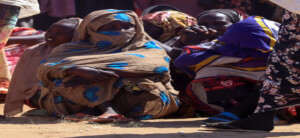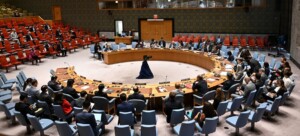Nominee US Ambassador to Sudan appears before Senate
The appointment of an official US Ambassador to Sudan has moved one step closer after US ambassadorial candidates for Sudan and South Sudan, South Africa, Zambia, Tanzania, and Kenya, appeared before the US Senate committee in Washington last week. If John Godfrey, who has been nominated by the Biden administration to take-up the post, is appointed, he will be the first fully ranked ambassador to the country in 25 years. Sudan is currently served by a deputy ambassador.
 John Godfrey, nominee US Ambassador to Sudan (Photo: US State Dept.)
John Godfrey, nominee US Ambassador to Sudan (Photo: US State Dept.)
The appointment of an official US Ambassador to Sudan has moved one step closer after US ambassadorial candidates for Sudan and South Sudan, South Africa, Zambia, Tanzania, and Kenya, appeared before the US Senate committee in Washington last week. If John Godfrey, who has been nominated by the Biden administration to take-up the post, is appointed, he will be the first fully ranked ambassador to the country in 25 years. Sudan is currently served by a deputy ambassador.
John Godfrey is no stranger to the region – during his time in Libya before the fall of Muammar Gaddafi, he worked on humanitarian and political issues related to Darfur; in the Counterterrorism Bureau.
With that background, he sees the nomination as a chance to continue the fight against terrorism – a key problem in the region.
“In important ways, this nomination represents a continuation of those efforts [terrorism fight]. If confirmed, I will draw on that broad experience to advance US interests in Sudan,” he said.
The USA was set to send an ambassador just under a year after the 25 October 2021 coup which had affected humanitarian work.
“Doing so [arrival in Sudan] is urgently important in light of Sudan’s economic and humanitarian crises.
“Economic reforms that would have led to debt relief and international support were paused due to the military takeover, sparking a fiscal crisis and hyperinflation,” Godfrey said.
“This new nation, already weakened by a transitional government failing to live up to commitments made first in 2015 and then again in the 2018 peace agreement,” he said.
After a distinct thaw in US-Sudan relations following the overthrow of the Al Bashir regime and a movement toward democratic transition, relations between Washington and Khartoum have been strained following the subsequent the military coup d’état of October 25 last year.
The USA suspended all aid to Sudan following the coup, staing that “the United States is pausing assistance from the $700 million in emergency assistance appropriations of Economic Support Funds for Sudan. Those funds were intended to support the country’s democratic transition as we evaluate the next step for Sudan programming.”
On May 11, the US Senate passed a draft resolution “to condemn the military coup in Sudan and support the Sudanese people,” and the House of Commons also unanimously passed the non-binding resolution with a quick vote without any objections.
On March 23, the US Senate’s Foreign Relations Committee unanimously approved a draft resolution condemning the military coup in Sudan and calling on the US administration to impose sanctions on those responsible for the coup.
The draft resolution came two days after the US Treasury imposed sanctions on the paramilitary Central Reserve Forces (popularly called Abu Teira) that stand under the command of the police, in accordance with the Global Magnitsky Act* on serious violations of human rights.
The Treasury listed the excessively violent repression of peaceful pro-democracy protests by the security forces as the main reason.
There have been wide calls for targeted US sanctions on the Chairman of Sudan’s Sovereignty Council Gen Abdelfattah El Burhan and deputy Chairman Mohamed ‘Hemeti’ Dagalo for their involvement in serious human rights abuses following the coup.
In March, the US Department of the Treasury’s Office of Foreign Assets Control (OFAC) announced sanctions on the Sudan Central Reserve Police (CRP, popularly known as Abu Tira) for serious human rights abuse yesterday. The Treasury listed the excessively violent repression of peaceful pro-democracy protests by the security forces as the main reason.
Last week, the US Department of the Treasury’s Office of Foreign Assets Control (OFAC) announced sanctions against ‘Sudan companies with links to Hamas‘, with one financier, Hisham Younis Yahia Qafisheh, allegedly “operating and managing at least two Sudan-based companies, Agrogate Holding and Al Rowad Real Estate Development, in order to generate revenue for the Palestinian group.”
Bilateral agreement
In November 2020, Sudan and the US signed a bilateral claims settlement to resolve “default judgements and claims based on allegations that Sudan’s prior regime supported acts of terrorism”. According to the agreement, Sudan had to pay $335 million, on top of approximately $72 million already paid, for distribution to victims of terrorism.
Sudan’s removal from the SST list, decreed in the dying days of the Donald Trump administration, was conditional on a bilateral claims settlement signed in November 2020 to resolve “default judgements and claims based on allegations that Sudan’s prior regime supported acts of terrorism”. Sudan had to pay $335 million, on top of approximately $72 million already paid, for distribution to victims of terrorism.
In exchange, after payment of compensation to the families of the victims of the bombing of the destroyer USS Cole in Yemen in 2000, and the 1998 bombing of the US embassies in Dar El Salaam in Tanzania and Nairobi in Kenya, the default judgments and claims against Sudan in US courts would be dismissed, and Sudan’s sovereign immunities under US law would be restored to those enjoyed by countries that have never been designated by the US as a State Sponsor of Terrorism (SST).
*The Global Magnitsky Act of 2016 authorises the US government to sanction foreign government officials worldwide who are deemed to be human rights offenders. Sanctions can include freezing their assets and banning them from entering the USA.











 and then
and then